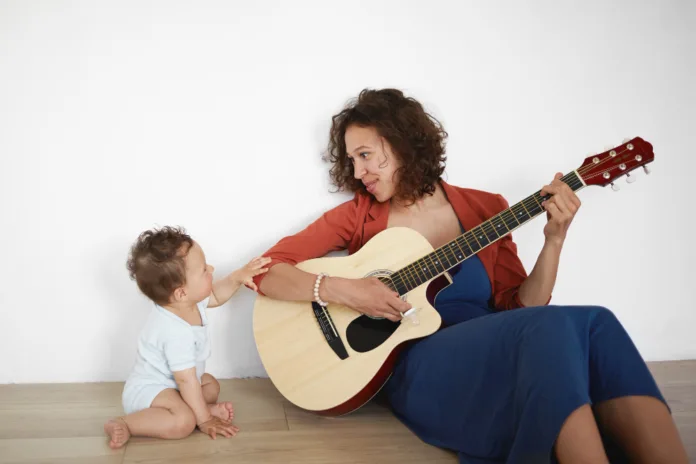Scientists find group singing helps new mothers recover from postnatal depression long-term
New research has revealed that singing together could help mothers recover from postnatal depression, easing symptoms for up to six months after the sessions end.
The study, conducted by the Institute of Psychiatry, Psychology & Neuroscience (IoPPN) at King’s College London and the social enterprise Breathe Arts Health Research, found that a specially designed community singing programme, Breathe Melodies for Mums, was not only effective but also affordable and well-received by participants.
Published in the British Journal of Psychiatry, the research is the first to evaluate both the clinical and cost-effectiveness of group singing as a treatment for postnatal depression. It forms part of the SHAPER programme, which assesses how arts-based activities can improve health and wellbeing.
Postnatal depression affects around one in four mothers in the UK, leading to prolonged feelings of sadness, hopelessness, and difficulty bonding with their babies. Left untreated, it can have serious long-term consequences for both mother and child, impacting infant development and the mother–child relationship.
To explore whether singing could help, researchers recruited 199 mothers experiencing postnatal depression from family and children’s centres across South London. The participants were randomly divided into two groups: one took part in the Breathe Melodies for Mums sessions, while the control group joined other mother-baby activities that did not involve singing.
Both groups attended sessions over 10 weeks, with follow-ups at weeks 6, 10, 20, and 36. Researchers measured depression severity using validated clinical scales.
At the 10-week mark, both groups showed improvements in mood. However, only the mothers in the singing group continued to show significant reductions in depressive symptoms at 20 and 36 weeks, lasting up to six months after the sessions ended.
Embed from Getty ImagesThe benefits extended beyond clinical recovery. The singing group had a much lower dropout rate — 23% compared with 43% in the control group. Participants also reported that they “liked and welcomed” the sessions, describing them as easy to attend and well-suited to their needs.
“Unfortunately, postnatal depression is a common illness experienced by many new mothers,” said Professor Carmine Pariante, senior author of the study and Professor of Biological Psychiatry at King’s IoPPN. “While psychotherapy and medication can help, stigma and practical barriers often prevent women from accessing them. This research shows that singing offers an alternative form of support that’s effective, engaging, and accessible.”
The study also assessed the cost to the NHS. According to the National Institute for Health and Care Excellence (NICE), treatments costing up to £30,000 per year of perfect health are considered cost-effective. The singing intervention, at between £11,122 and £21,215, falls well within this range.
“At a time when the NHS is under immense pressure to make every pound count, this intervention is a demonstrably good use of resources,” said Dr Rebecca Bind, the study’s first author. “It offers powerful, lasting benefits for mothers — and potentially their babies too.”
Yvonne Farquharson, Managing Director of Breathe Arts Health Research, called the findings “a game-changer”. She said: “This study proves that our creative health approach can be a viable and evidence-based pathway for women who may not otherwise access traditional healthcare. We hope commissioners and funders across the UK recognise how life-changing this can be.”
For mothers like Girija, who took part in the programme after a traumatic early birth experience, the benefits were deeply personal. “Singing in Breathe Melodies for Mums gave me space for all my feelings,” she said. “The songs helped me process the trauma of my son’s birth and gave me a powerful tool to bond with him. Even now, when he’s unsettled, I sing those same songs — they calm him, and they calm me.”
The study, funded by Wellcome and supported by the NIHR Maudsley Biomedical Research Centre, demonstrates how creative, community-based therapies can play a vital role in mental health treatment.
As Professor Pariante concluded: “Music has the power to connect, comfort, and heal. For many new mothers, that connection might be exactly what’s needed to find their voice again.”
